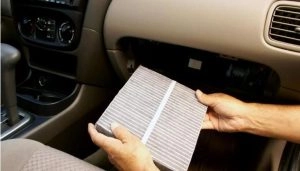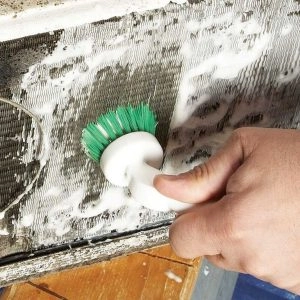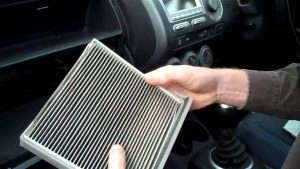Car air conditioning is essential in the summer, as it helps cool the temperature inside the car and makes journeys more comfortable. It's certain that the air conditioner's filter plays a significant role in this aspect, as it assists in purifying the indoor air and removing dust, insects, and unpleasant odors.
However, if it is not well maintained, it would result in the air conditioning not functioning effectively, and could even lead to the damage of other parts of the system. Therefore, we will discuss 5 signs of damage to the car's air conditioning filter and how to properly maintain it.

Signs of Air Conditioner Filter Damage
FilterCar air conditionerIt is a very important part of the system, as it purifies the air and removes the small particles it contains. However, with continuous use, the filter can get damaged and need replacement. Here are 5 signs that indicate damage to the air conditioning filter:
The airflow from the air conditioning vents is decreasing.
The airflow in the air conditioning system is affected when the AC filter is dirty or clogged with dust and impurities, preventing the air from flowing properly and resulting in a decrease in the amount of cold air that comes out of the AC vents.
When the airflow in the air conditioning system is affected, it leads to an increase in the engine temperature and the air temperature. It can also lead to increased fuel consumption due to the engine bearing more strain to push the sufficient amount of air.
In addition, a decrease in airflow in the air conditioning system can lead to moisture accumulation inside the filter, thereby causing fogging on the windows. It may also increase the likelihood of mold and bacteria forming inside the cabin, affecting the health of the passengers.
Decrease in power output from the engine.
When there is a decrease in air flow from the air conditioner due to a blocked air filter, the engine has to work harder to maintain the required air flow to operate the system correctly. This means the engine consumes more energy than usual to do the same job.
Moreover, when the engine has to work harder, fuel consumption increases to generate the required power. This means that a decrease in air flow can lead to higher operating costs. Additionally, it can result in increased exhaust emissions due to excess fuel consumption.
Also read:4 Signs Indicating Damage to the Air Conditioning Compressor: Do You Need to Repair it?

Increase in dust and allergens.
Since the air conditioner filter is no longer capable of adequately filtering the air, allergens, dust, odors, and other impurities can easily pass into the air conditioning system.
This may lead to increased levels of these substances and impurities within the system, making the air unhealthy and increasing the risk of individuals being exposed to allergies and respiratory diseases.
A blocked or damaged air conditioner filter can lead to the clogging of drainage pipes and moisture traps, resulting in the accumulation of moisture and mold within. Therefore, it is essential to replace the blocked filter regularly to maintain the quality of the air conditioner and the health of individuals.
Ice appears on the air conditioner unit.
When cold air accumulates inside the air conditioner due to weak airflow, this can lead to a decrease in the temperature of the air emitted from the air conditioner and the formation of ice on the air conditioner's parts. This could ultimately lead to damage to the air conditioner.
Uncomfortable temperatures
When the air conditioner filter is dirty and clogged, it prevents the flow of cold air that passes through the air conditioner and lowers the temperature of the indoor air. As a result, it becomes difficult for the air conditioner to control the indoor air temperature and keep it at the desired level, leading to uncomfortable temperatures inside the car.
Passengers might feel excessive heat, discomfort, frustration, and fatigue, which can result in a poor driving experience. Therefore, the air conditioner filter should be regularly checked and replaced to maintain smooth air flow and control the internal temperature of the car.
If those symptoms are ignored and the clogged filter is left without replacement for a long period of time, this may ultimately lead to engine damage and you being forced to bear the cost of expensive repairs.
How to maintain the air conditioner filter.
To maintain your car's air conditioner filter and ensure its efficient operation, you should follow these steps:
Changing the filter: It is recommended to regularly change the filter according to the car manufacturer's recommendations. The interval may vary between different car models, but usually, the filter is changed every 12,000 to 15,000 miles.
Ensure the quality of the filter: It is important to ensure the quality of the used air conditioner filter and not to select cheap filters that could potentially allow pollutants to enter the air conditioning system.
Checking the filter condition: It is necessary to regularly check the condition of the filter, remove any impurities or dirt that may have been transferred to the filter, and ensure that there is no damage or corrosion.
Cleaning the Channels: The channels and openings connecting the filter to the car's ventilation system must be cleaned. This can be done using a soft brush or an air vacuum, ensuring that there is no dirt or debris obstructing the efficient flow of air.
Using the appropriate filter: You must choose the air conditioner filter that suits the car's requirements and the manufacturer's recommendations, as filter specifications vary by model and brand.

DeterminationReplacement TimingThe replacement timing should be precisely determined, based on the distance travelled and driving conditions, and according to the requirements and recommendations of the manufacturer.

Comments